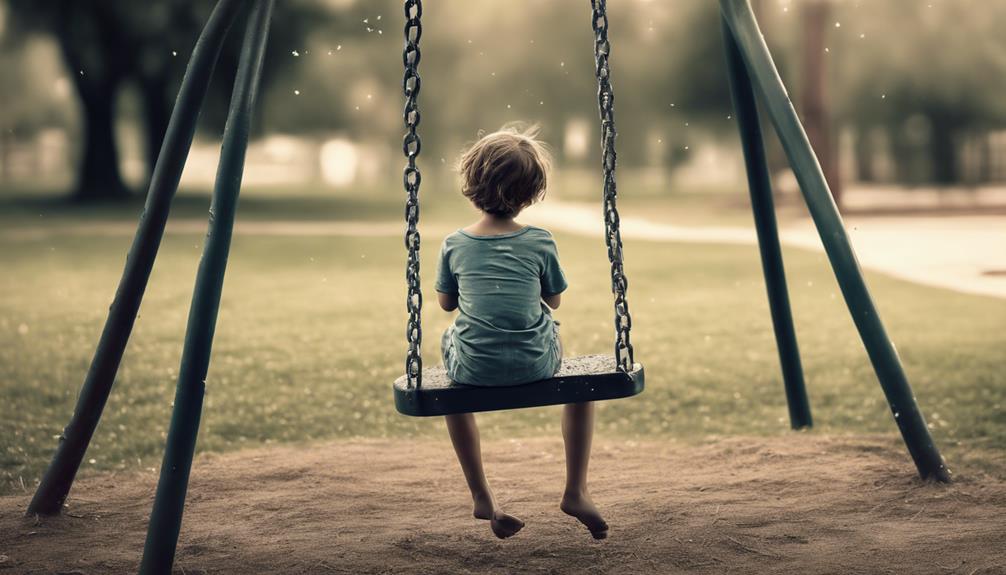Exploring the emotional stories of children coping with the aftermath of divorce, we confront a stark reality that shines a light on the profound emotions and obstacles these young individuals encounter.
Each story encapsulates a unique journey of resilience and pain, offering a glimpse into the unseen battles fought behind closed doors.
These narratives provide a poignant reminder of the resilience and vulnerability that coexist within the hearts of children, urging us to pause and reflect on the profound impact of divorce on their tender lives.
Key Takeaways
- Emotional manipulation and neglect during divorce lead to children feeling like pawns in parental battles.
- Financial struggles post-divorce impact children's well-being, limiting provisions and affecting self-esteem.
- Step-family challenges include feelings of alienation, envy towards step-siblings, and navigating two family dynamics.
- Daily disruptions from juggling between parents' households cause emotional turmoil, instability, and anxiety in children.
Emotional Manipulation and Guilt-Tripping
During divorce, children often endure emotional manipulation and guilt-tripping from parents, leading to significant distress in their lives. It's heart-wrenching to witness how parents, consumed by their struggles, sometimes forget the impact on their children.
Mom, in an attempt to seek affection and love, unintentionally creates a stressful environment by guilt-tripping the child. The child, torn between loyalty and personal well-being, feels pressured to comply with demands that prioritize the struggling parent's needs over their own.
This dynamic not only adds a heavy emotional burden on the child but also blurs the lines of healthy parent-child relationships. Children should never feel obligated to provide emotional support beyond their capacity, especially during the vulnerability of a parents' divorce.
It's crucial for parents to remember that their children's emotional well-being should be a top priority, even amidst the chaos of separation.
Children Used as Pawns in Divorce

Feeling like mere pawns in their parents' divorce battles, children endure emotional turmoil as they're used as tools in conflicts that disrupt their sense of security and identity. Witnessing parental disagreements and being involved in court proceedings can deeply impact our self-identity, leaving us feeling lost and confused.
Our parents' focus on their own needs during this time can sometimes lead to the neglect of our emotional well-being, leaving us to navigate complex emotions on our own. The emotional burden of being caught between our parents' conflicting demands can cause immense distress, making us feel overwhelmed and helpless in the midst of the chaos.
- Our sense of security is shattered as we're placed in the middle of parental conflicts.
- We struggle to maintain a stable self-identity amidst the turmoil of our parents' divorce.
- The emotional toll of being used as pawns in our parents' divorce leaves lasting scars on our well-being.
Silent Suffering of Bullying

Experiencing bullying as children of divorce can compound the emotional challenges already faced during this tumultuous time. Being a child of divorce makes us vulnerable to bullying, as the emotional distress and turmoil in our lives can attract negative attention from others. Bullying adds an extra layer of pain to an already difficult situation, making us feel even more isolated and alone. It can exacerbate the feelings of insecurity and worthlessness that often accompany the divorce of our parents.
| Emotions | Impact | Coping Mechanisms |
|---|---|---|
| Fear | Deepens emotional wounds | Seeking comfort in safe spaces |
| Sadness | Increases feelings of loneliness | Finding solace in supportive friendships |
| Anger | Intensifies sense of injustice | Expressing emotions through creative outlets |
| Shame | Heightens self-blame | Building self-confidence through positive affirmations |
During this challenging time, positive experiences at one parent's house can offer a much-needed respite from the bullying we may face, providing a sense of safety and security in the midst of turmoil.
Conflicting Expectations From Parents

We understand the immense challenges children of divorce face when caught in the crossfire of conflicting expectations from their parents.
It can be heart-wrenching for kids to navigate parental disagreements, feeling torn between loyalty to each side.
The impact of these conflicting expectations can lead to confusion, inner turmoil, and a sense of helplessness for the children.
Parental Disagreement Impact
Navigating conflicting expectations from parents can be an overwhelming challenge for children post-divorce. It's tough when mom and dad don't see eye to eye, and we're caught in the middle, trying to please both. Here's how it affects us:
- Feeling torn between parents' different rules and expectations
- Struggling to meet conflicting demands and feeling pressured
- Fearing disappointing one parent by siding with the other
These situations can make us feel like we're walking on eggshells, trying not to upset anyone. It's hard when what one parent expects contradicts the other's wishes. We just want both our parents to understand and support us, even if they can't agree with each other.
Kids Caught in Middle
Caught between the conflicting expectations of our parents, children of divorce often find themselves in a challenging emotional tug-of-war, especially during high school. The pressure to please both parents while dealing with their differing demands can be overwhelming. It's like walking a tightrope, trying not to upset either side.
We may feel torn between wanting to make each parent happy and feeling guilty when we can't. The constant juggling act of balancing our parents' expectations can lead to feelings of confusion, frustration, and even resentment. It's tough to navigate through this maze of conflicting emotions, trying to find our own voice amidst the chaos of conflicting loyalties.
Confusion Over Loyalties
Feeling torn between the conflicting expectations of divorced parents can leave children in a heartbreaking emotional quandary, struggling to balance loyalty and love amidst the chaos. It's a challenging position for kids to navigate, as they try to meet the needs of both parents while also taking care of themselves.
In these situations, children often face pressure to prioritize their parents' desires over their own emotional well-being, leading to feelings of inadequacy and guilt. The conflicting expectations can create a sense of confusion and inner turmoil, leaving children feeling excluded or left out in the midst of parental conflicts and demands.
- Juggling parental expectations can be overwhelming.
- Children may feel torn between loyalty to both parents.
- Conflicting demands can lead to emotional distress.
Living Out of a Bag: Lack of Stability

Living a life where one hops between different homes like a nomad can deeply unsettle the hearts of children of divorce, leaving them yearning for a stable anchor amidst the turbulent waters of change. The constant movement between parents' houses can create a sense of instability, making it challenging for children to establish a sense of belonging and security. When living out of a bag, maintaining a consistent routine or environment becomes difficult, leading to feelings of detachment from their childhood homes. Emotionally, the constant shifting between households can contribute to turmoil, leaving children feeling like they lack a permanent place to call home. It's heartbreaking to witness children carry their belongings from one place to another, yearning for a sense of stability and permanence.
| Challenges | Impact |
|---|---|
| Lack of stable environment | Sense of belonging affected |
| Difficulty in maintaining routines | Security compromised |
| Emotional turmoil | Detachment from childhood homes |
Financial Struggles and Neglect

We understand the heart-wrenching reality that some children of divorce face financial struggles and neglect, which can have lasting emotional impacts.
It's distressing to think about children going without essentials like food or missing out on enriching experiences due to financial constraints. These challenges underscore the importance of addressing financial issues post-divorce to safeguard the well-being of the children involved.
Emotional Impact of Neglect
Facing financial struggles post-divorce can inadvertently result in neglecting the emotional needs of children, impacting their overall well-being and development. It has been years since our family went through the divorce, and the emotional toll of neglect can be profound.
Here are some ways neglect can affect children:
- Limited food provisions during visits due to financial struggles.
- Restrictions on extracurricular activities because of financial disputes.
- Decrease in household income leading to a lower living standard for children.
These situations can create feelings of insecurity and distress in children, affecting their self-esteem and emotional stability. It's crucial for parents to prioritize their children's emotional needs alongside financial responsibilities to ensure a healthy and supportive environment post-divorce.
Financial Stress and Children
Experiencing financial stress post-divorce can inadvertently lead to neglecting children's emotional needs, exacerbating the challenges they face during this difficult time. The strain of financial disputes and limited resources can create a ripple effect, impacting a child's well-being profoundly.
When non-custodial parents resent child support payments, it can result in diminished provisions, affecting essential needs like food and extracurricular opportunities. The financial struggles post-divorce may lead to restrictions on activities that are crucial for a child's development and happiness.
Decreased household income post-divorce can destabilize the family's financial security, affecting the child's sense of stability. It's vital to recognize and address how financial stress can impact children, ensuring their needs are met during this challenging period.
Feeling Alienated in Step-Families

Navigating the complexities of step-family dynamics can often leave children feeling disconnected and excluded. It's a challenging journey that many of us have experienced firsthand. Here are some insights into how feeling alienated in step-families can impact a child's emotional well-being:
- Struggling with a sense of belonging: The constant tug-of-war between two families can make us feel like we don't truly fit in anywhere.
- Envy towards step-siblings' family life: Seeing the seemingly perfect relationships within our step-siblings' family can trigger feelings of jealousy and further isolate us.
- Limited relationship with parents post-divorce: When our connections with our parents are strained due to the divorce, it can intensify the feeling of not being part of either family fully.
These emotions are raw and real, but remember, you aren't alone in this journey. With time, patience, and support, it's possible to navigate these challenges and find a sense of belonging within your step-family.
Chaos and Disorganization in Daily Life

In the midst of daily turmoil and uncertainty, we find ourselves grappling with the disarray and lack of structure that comes from juggling between our parents' households. The constant shifting between different routines and environments over the years due to our parents' divorce has left us feeling unsettled and overwhelmed. Each house has its unique set of rules, schedules, and expectations, making it challenging for us to find a sense of stability and consistency.
The lack of a stable routine has caused emotional turmoil and confusion, leaving us with a fractured sense of stability and belonging. Moving back and forth between our parents' houses has created a sense of disorganization that impacts our daily lives. The constant changes in living arrangements contribute to our feelings of instability and insecurity, making it hard for us to feel grounded.
Living in disorganized environments at our parents' houses has taken a toll on our emotional well-being and sense of security. The chaos and lack of structure in our daily lives due to the divorce have made it difficult for us to find a sense of peace and normalcy.
Anxiety From Parental Interactions

Feeling the tension and conflict between our parents can stir up deep-seated anxiety within us, affecting our sense of well-being and stability. Witnessing our parents' disputes can leave us feeling overwhelmed and uncertain about the future, intensifying our anxiety levels.
The fear of inadvertently upsetting one parent by mentioning the other can create a constant state of worry and unease in our minds. This anxiety from parental interactions can manifest in various ways, impacting our emotional well-being and ability to cope with everyday challenges.
- The constant fear of parental conflicts affecting our lives can lead to heightened anxiety levels.
- Suppressing our emotions and thoughts about our parents' interactions can amplify our anxiety and stress.
- Anticipating negative exchanges between our parents can trigger anxious reactions, further destabilizing our sense of security and peace of mind.
Envy of Step-Siblings' Lives

We know how challenging it can be to witness the privileges enjoyed by step-siblings, leading to feelings of resentment. Comparing our lifestyles with theirs can easily breed jealousy, intensifying the sense of being left out emotionally.
It's a tough emotional journey, longing for a similar bond and struggling with the complexities of step-sibling relationships.
Step-Siblings' Privileges Cause Resentment
Often overlooked are the deep-seated emotions that can arise in children of divorce due to the envy of their step-siblings' seemingly more privileged lives. Witnessing the differential treatment and opportunities can lead to feelings of resentment and emotional turmoil. Here are some key points to consider:
- Emotional Turmoil: Differences in treatment between step-siblings can cause emotional upheaval.
- Feelings of Exclusion: Witnessing step-siblings' favorable treatment can intensify feelings of exclusion and inadequacy.
- Struggles with Belonging: Envy of step-siblings' environments can exacerbate emotional struggles and reinforce feelings of not belonging.
Navigating the complexities of step-sibling dynamics while managing these emotions is a common challenge for children of divorce.
Comparing Lifestyles Breeds Jealousy
Comparing lifestyles between step-siblings can often ignite feelings of jealousy and inadequacy in children of divorce. It's natural for us to look at what others have and feel envious, especially when it comes to our step-siblings' seemingly better lives. This can create a sense of disparity in financial and emotional support, making us feel left behind. Here's a table to illustrate the impact of comparing lifestyles on our emotions:
| Effects of Comparing Lifestyles | Emotional Impact | Result |
|---|---|---|
| Highlighting disparities in support | Inadequacy | Jealousy |
| Feeling excluded or neglected | Envy | Turmoil |
| Difficulty in forming connections | Emotional struggle | Isolation |
These feelings of envy towards our step-siblings can be overwhelming, leading to emotional turmoil and hindering our relationships with them.
Feeling Left Out Emotionally
Feeling excluded and overwhelmed by the seemingly closer bond between step-siblings and a shared parent can deeply impact children of divorce emotionally, fostering a sense of yearning for belonging and connection. It's a challenging situation to navigate, filled with complex emotions that can be difficult to express.
In this context, children may experience feelings they never thought they would, such as envy and loneliness. This emotional turmoil can lead to a sense of not fitting in or being an outsider in their own family. As they witness the seemingly harmonious relationships between their step-siblings and the shared parent, it can intensify their longing for a similar connection and deepen their feelings of being left out.
- Envy towards step-siblings' family life
- Sense of exclusion and not belonging
- Yearning for a closer bond with the shared parent
Frequently Asked Questions
At What Age Is a Child Most Affected by Divorce?
We believe children are most affected by divorce between 8 and 14 years old, when they face heightened distress and identity challenges. The impact varies based on resilience, family support, and understanding of divorce complexities.
What Not to Say to Kids During Divorce?
During divorce, let's avoid blame, adult details, broken promises, using kids as messengers, and negative comments about the other parent. We must protect our children's hearts and minds, offering stability and love.
Do Children of Divorce Divorce Themselves?
Yes, we understand the question. Children of divorce are more likely to divorce themselves due to factors like parental conflict and emotional trauma. Witnessing divorce can impact their future relationships, leading to trust issues.
Will a 4 Year Old Remember Divorce?
We believe that a 4-year-old can remember divorce due to their developing memory and emotional abilities. Though they may not fully understand, the changes in family dynamics leave an emotional imprint that can shape their future.
Conclusion
As we reflect on the heartbreaking stories shared by children about their experiences with divorce, it's important to note that 40-50% of marriages in the United States end in divorce.
This statistic serves as a stark reminder of the widespread impact divorce has on families and children.
Let's continue to support and empathize with these young individuals as they navigate the challenges of divorce and work towards healing and resilience.










